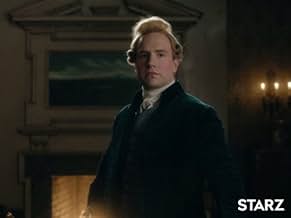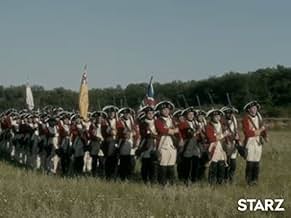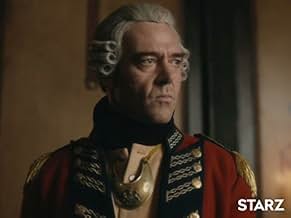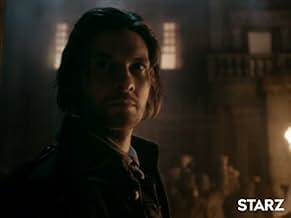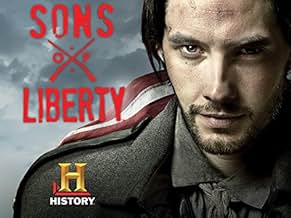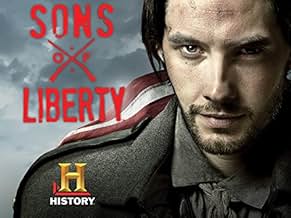La historia de un grupo de hombres muy diferentes que luchan en las colonias americanas por la libertad, y cómo forjarán el futuro de los Estados Unidos de América. Basada en hechos reales.La historia de un grupo de hombres muy diferentes que luchan en las colonias americanas por la libertad, y cómo forjarán el futuro de los Estados Unidos de América. Basada en hechos reales.La historia de un grupo de hombres muy diferentes que luchan en las colonias americanas por la libertad, y cómo forjarán el futuro de los Estados Unidos de América. Basada en hechos reales.
- Premios
- 2 premios ganados y 7 nominaciones en total
Explorar episodios
Opiniones destacadas
My word, this stuff is some kind of Batman, Spiderman, etc version of the revolutionary days in Massachusetts. As a Bostonian who knows more than a bit about Sam Adams, John Adams, John Hancock, and even more about Paul Revere, I hardly recognized them, or even many of the events depicted. At first, I thought maybe I was getting senile, but the manure just kept piling higher til I realized that is what much of it is.
Sam Adams was deeply religious and had little (none) of the comedian about him. That is exactly why he doesn't get the recognition he DESERVES among the Founding Fathers. He was boring and RELIGIOUS. This series gets NONE of that right.
What in the universe does General Gage's WIFE have to do with anything? I'll tell you. Absolutely nothing. More completely fictional plot threads to ... what ... make sure some women keep watching and to make sure we understand how evil Gage was? Oh boy.
The Boston Tea Party!!!!! It seems the British soldiers were invited and they stood around and watched!!! LMAO!!! People, listen, most of this stuff in the first 1.5 episodes isn't really true. But still, thanks for watching, and now go learn about the REAL SAM ADAMS.
Sam Adams was deeply religious and had little (none) of the comedian about him. That is exactly why he doesn't get the recognition he DESERVES among the Founding Fathers. He was boring and RELIGIOUS. This series gets NONE of that right.
What in the universe does General Gage's WIFE have to do with anything? I'll tell you. Absolutely nothing. More completely fictional plot threads to ... what ... make sure some women keep watching and to make sure we understand how evil Gage was? Oh boy.
The Boston Tea Party!!!!! It seems the British soldiers were invited and they stood around and watched!!! LMAO!!! People, listen, most of this stuff in the first 1.5 episodes isn't really true. But still, thanks for watching, and now go learn about the REAL SAM ADAMS.
This miniseries is entertaining as a drama if you can set aside its various gross historical inaccuracies. So, pretend that it portrays the American Revolution in an alternate dimension, perhaps even pretend that it's a prequel to "Abraham Lincoln: Vampire Hunter," and you'll do much better that way. But, if instead you insist on expecting that its writers were objective wherever possible, keeping away from bias when none was required, then crawl back underneath your rock, please, because that has never been the History Channel's dealing. And this time, take a moment while you're down there to appreciate what a great name for a propaganda mill, "The History Channel" really is; it almost may as well call itself "The Ministry of Truth." What is most obvious and transparent about this miniseries' disinterest in truth is its disinterest in history.
There has been a tendency lately to "upgrade" works set in historical times be they fictional or true. Operas and plays written 100 and more years ago which take place in Europe during centuries past are being put into places like Las Vegas and California. Even Shakespeare has not been immune from updated versions of his plays, such as the film Richard III in which the medieval king is portrayed as a high-ranking British fascist of the 1930's! The trend is now infiltrating film productions which are supposed to take place in historical settings. One of the worst such productions was the recent HBO "The Tudors". The present History Channel offering of "The Sons of Liberty" is another such offering. At the same there are some good things in the series.
While there is much to be praised about this production, including wonderful sets and effects, the dialog and mannerisms of the characters are so 21st century I kept being reminded that the production was from the 2000's. A good period piece allows the audience to be transported, albeit temporarily, to another time where manners and culture were quite distinct from today. In 18th century Britain and America, class distinctions were highly pronounced and obvious. Working class adults would refer to any of the aristocracy as "sir" or "madam". There would even be the occasional bow from working class males and curtsies engaged by working class women to members of the aristocracy. Working class children would refer to any adult male as "sir", and more than likely, children were told to do things, not asked.
The present production, trying too desperately to appeal to 21st century American sensibilities, throws much of the formalities and mannerisms of 18th century life out the window in favor of more casual interactions. A young boy among the Sons of Liberty is often "asked" to do things, much like they are today, but children were ordered around. And working class children in this production don't use the formal "sir" enough. If an adult wished a child to engage in a task, it was expected to be done, not "would you please..." The expected interaction would be "Do this" with the response "right away, sir." Now, we can debate about whether this kind of treatment was unfair, but that's how it was in the 18th century. Also, working class members would be very formal towards superiors except in private conference.
In an interesting scene, John Hancock throws a party for the birthday of King George III, which was common for colonists and other subjects of Britain. (The custom still occurs today in Britain.) During the party, John Hancock walks and chats with then Lieutenant Governor Hutchinson who ranked just below the governor of Massachusetts and New Jersey who ruled at the behest of Britain and the King. (In a sense, the governor was the voice of the king.) In this context, Hutchinson would definitely be Hancock's superior although both were part of the aristocracy of the colonies. Several times, Hancock turns his back on the lieutenant governor to say hello to other arrivals. This would have been considered a gross faux pas by 18th century standards. You would never turn your back on a ranking official, even a lieutenant governor, in a social occasion to speak to others. You would ask permission to do so, and others would not interrupt if you were in conference with a superior. In other scenes, I heard people saying the epithet "bs", which I don't think existed at that time. People did swear, but never to those of higher rank and certainly not in mixed company.
The most interesting aspect of the series has to do with the behind-the-scenes business deals. These are what the Sons of Liberty did to avoid taxation. Still worth watching but I would have liked the filmmakers to consult with some historians concerning the correct manners and culture of the time. The HBO Series "John Adams" is much more accurate in this regard. This is after all supposed to be a presentation from the History Channel. Why not be as accurate possible, unless executive are worried that younger viewers won't "identify with it? Better than "The Tudors" but not as a good as "John Adams".
While there is much to be praised about this production, including wonderful sets and effects, the dialog and mannerisms of the characters are so 21st century I kept being reminded that the production was from the 2000's. A good period piece allows the audience to be transported, albeit temporarily, to another time where manners and culture were quite distinct from today. In 18th century Britain and America, class distinctions were highly pronounced and obvious. Working class adults would refer to any of the aristocracy as "sir" or "madam". There would even be the occasional bow from working class males and curtsies engaged by working class women to members of the aristocracy. Working class children would refer to any adult male as "sir", and more than likely, children were told to do things, not asked.
The present production, trying too desperately to appeal to 21st century American sensibilities, throws much of the formalities and mannerisms of 18th century life out the window in favor of more casual interactions. A young boy among the Sons of Liberty is often "asked" to do things, much like they are today, but children were ordered around. And working class children in this production don't use the formal "sir" enough. If an adult wished a child to engage in a task, it was expected to be done, not "would you please..." The expected interaction would be "Do this" with the response "right away, sir." Now, we can debate about whether this kind of treatment was unfair, but that's how it was in the 18th century. Also, working class members would be very formal towards superiors except in private conference.
In an interesting scene, John Hancock throws a party for the birthday of King George III, which was common for colonists and other subjects of Britain. (The custom still occurs today in Britain.) During the party, John Hancock walks and chats with then Lieutenant Governor Hutchinson who ranked just below the governor of Massachusetts and New Jersey who ruled at the behest of Britain and the King. (In a sense, the governor was the voice of the king.) In this context, Hutchinson would definitely be Hancock's superior although both were part of the aristocracy of the colonies. Several times, Hancock turns his back on the lieutenant governor to say hello to other arrivals. This would have been considered a gross faux pas by 18th century standards. You would never turn your back on a ranking official, even a lieutenant governor, in a social occasion to speak to others. You would ask permission to do so, and others would not interrupt if you were in conference with a superior. In other scenes, I heard people saying the epithet "bs", which I don't think existed at that time. People did swear, but never to those of higher rank and certainly not in mixed company.
The most interesting aspect of the series has to do with the behind-the-scenes business deals. These are what the Sons of Liberty did to avoid taxation. Still worth watching but I would have liked the filmmakers to consult with some historians concerning the correct manners and culture of the time. The HBO Series "John Adams" is much more accurate in this regard. This is after all supposed to be a presentation from the History Channel. Why not be as accurate possible, unless executive are worried that younger viewers won't "identify with it? Better than "The Tudors" but not as a good as "John Adams".
All of the reviews by my fellow history buffs that are critical of the show are missing the point. First, the History Channel freely admits that the show is historical fiction. Second, you are not the intended audience.
History Channel is trying to reach a younger audience--I'm guessing 40 and younger. To the extent that these people have been taught American history at all, what they've heard is at best boring and, more likely, downright anti-American. So what if they make Sam Adams a hunky, charismatic, hipster instead of a middle-aged father of two with a history of failed careers? They're still watching--which they would not have been had the show be historically precise.
One of my biggest complaints about my own formal education in American history was how it robbed the founding fathers of their personalities and complexities. In this series, George Washington isn't portrayed accurately, but he's portrayed as a vital, dominating, brave, and forceful man instead of a two-dimensional caricature that no one could relate to. Maybe John Hancock didn't go through the precise passage that he did in Sons of Liberty, but he still did progress from solid businessman to revolutionary. If you have to simplify that process to make it understandable, I'm all for it.
I get misty-eyed every time I hear the phrase "our lives, our fortunes, and our sacred honor" because I know how literal a pledge it was to the men who made it. Maybe Sons of Liberty can help the uninitiated feel a little of that awe and respect.
History Channel is trying to reach a younger audience--I'm guessing 40 and younger. To the extent that these people have been taught American history at all, what they've heard is at best boring and, more likely, downright anti-American. So what if they make Sam Adams a hunky, charismatic, hipster instead of a middle-aged father of two with a history of failed careers? They're still watching--which they would not have been had the show be historically precise.
One of my biggest complaints about my own formal education in American history was how it robbed the founding fathers of their personalities and complexities. In this series, George Washington isn't portrayed accurately, but he's portrayed as a vital, dominating, brave, and forceful man instead of a two-dimensional caricature that no one could relate to. Maybe John Hancock didn't go through the precise passage that he did in Sons of Liberty, but he still did progress from solid businessman to revolutionary. If you have to simplify that process to make it understandable, I'm all for it.
I get misty-eyed every time I hear the phrase "our lives, our fortunes, and our sacred honor" because I know how literal a pledge it was to the men who made it. Maybe Sons of Liberty can help the uninitiated feel a little of that awe and respect.
To many historical inaccuracies, and too much use of modern idioms for my taste. John Adams was a much better miniseries.
¿Sabías que…?
- TriviaFilmed entirely in Romania.
- ErroresThe British flag depicted in the miniseries is historically incorrect. The flag shown didn't exist until 1806 (the union with Ireland).
- ConexionesReferenced in Chelsea Lately: Episode #8.109 (2014)
Selecciones populares
Inicia sesión para calificar y agrega a la lista de videos para obtener recomendaciones personalizadas
- How many seasons does Sons of Liberty have?Con tecnología de Alexa
Detalles
Contribuir a esta página
Sugiere una edición o agrega el contenido que falta

Principales brechas de datos
By what name was Sons of Liberty (2015) officially released in India in English?
Responda



